2013年人教新版八年级英语上册Unit_1
英语人教版八年级上unit1知识点笔记

Un i t 1 Wh e re d id yo u g o on v acation?1•一般过去时考点1:如何判断一般过去时?考点2:肯定句变否定句。
考点3:变一般疑问和特殊疑问句。
2•复合不定代词/副词构成: _________ _________ ___________ _________其中:(no one意思“______ ”指 __ ,与_________ 同义,且与of连用,做主语谓语用单三。
回答引起的特殊疑问句时要用no one.none意思“ ___ ”,指____________ ,且 __ 与of连用。
谓语单,复形式皆可。
回答 _________ 引起的特殊疑问句时要用none;-anyone意思" _____ ”扌旨___ ,与 __ 同义,且_____ 与of连用。
_any one 意思" ____ ”扌旨___ ,与 __ 同义,且_____ 与of 连用。
nothing= _________________用法:① 复合不定代词做主语,谓语动词用 ________ •②当adj.修饰不定代词要_________ •③ 当不定代词中含有some通常用于__________ ;含有any通常用于_______________我自己myself你自己他自己她自己它自己我们自己你们自己他们自己反身代词在句中可用作动词宾语、介词宾语、表语和同位语等,如:She can dress herself.作动词宾语)That?poor?boy?was?myself.(用作表语)Thefatherhimselfhassomething wrong.(同位语:句中常置于名词、代词之后或句子末尾We clean the room ourselves.(同位语:句中常置于名词、代词之后或句子末尾常用短语:穿衣服;?玩得快乐;随便吃;随便用;2.few 意为___________,修饰__________ 名词,倾向于否定。
2013秋人教版英语八年级上Unit1 Section A Period 2

eg: I lost my key somewhere near here.
3.It was wonderful!它太美了!(P2) wonderful形容 词,意为“极好的;精彩的;绝妙的”。 a. The film is so wonderful that we all enjoy it. b. I had a wonderful weekend. 4.We took quite a few photos there.我们在那里拍了不少 照片 take photos意为“照相;拍照”。 eg: We______ ______on the Great Wall.我们在长城上照了相。 took photos 辨析:quite a few与quite a little quite a few意为“相当的;不少”,修饰可数名词复数 quite a little意为“相当的;不少”,修饰不可数名词。 a. He will stay here for _____ _____ _____days. quite a few b. There is _____ _____ _____water in the bottle(瓶 quite a little 子).
1.buy anything special买特别的东西。(P2) 1)buy及物动词,意为“买;购买”其过去式为 bought ______。 buying I spend a lot of money _________a house.买房子 bought me 拓展:buy sth. for sb.=buy sb. sth.意为“给某人买某 物”。 Mybought a bike uncle_____ _____a bike. = My uncle_____ ___ ______for me. 2)anything不定代词,“某事;某件东西”,主要用于 疑问句或否定句中。 a. Do you want anything from me? b. I can’t say anything about it. 拓展:anything表“任何事,任何东西”时,用于肯定 句You can ask me anything you want to know. anything interesting 3) anything special表示“特别的东西”形容词修饰不定 代词时后置。a. Is there_______ _________in this
2013人教版八年级英语上Unit1-1.ppt
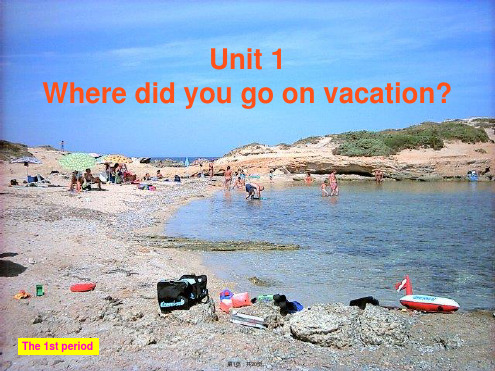
6. went to the beach __ a
7. visited museums___e
第16页,共20页。
1b Listen. Number the people (1-5) in the picture.
Lucy __d_i_d_n_’_ t_____d_o_ her homework at home. 2. His father worked all day last Monday.
(改一般疑问句) __D__id__ his father _____w_o_r_kall day last Monday? 3. I went to the movie last night. (对划线部分提问) ________ _______ ______ _____ _____ the movie?
this morning?
17. They _______ (be) always late for class last year.
were
18. What day _____ (be) it yesterday?
was
第7页,共20页。
句型转换
1. Lucy did her homework at home. (改否定句)
for the Chinese test last weekend.
4. What ___d_id__ you ____d_o_(do) last night? 5. On Sunday morning I ____p_l_a_y_e_d(play) tennis.
第5页,共20页。
2013新版八年级上Unit1
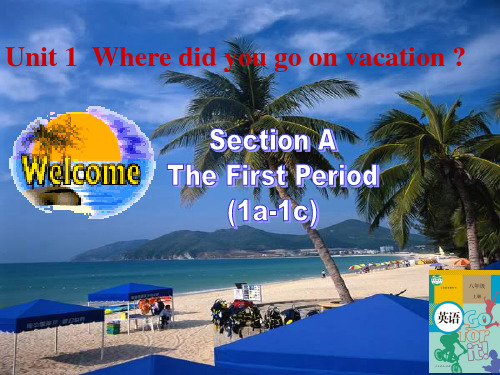
went to summer camp
went to the mountains
visited museum
Read :
Where did he go on vacation ? He went to New York City .
Where did she go on vacation ? She stayed at home and watched TV .
2a Listen. Where did the people
go on vacation? Complete the chart.
People Grace Kevin Julie
Places
New York City the beach
stayed at home
2b Listen again. Check Yes, I
Where did he go on vacation?
Where did he go on vacation?
He stayed at home.
Where did he go on vacation?
went to New York City visited his uncle
stayed at home went to the beach
get any fish
Conversation 3
Boy: Did you go anywhere on vacation, Tom? Tom: I went to summer camp. Boy: Did you go with anyone? Tom: Yes, I went with my friends. Everyone had a
去纽约
2013年八年级英语上册-Unit-1-Where-did-you-go-on-vacation-Section-A-3a-3c.
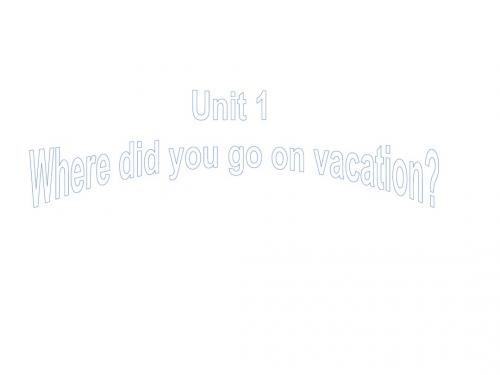
他自己 她自己 它自己
ourselves yourselves
themselves
我们自己 你们自己
他们自己
1. Did you buy anything for yourself? 你为你自己买什么东西了吗?(做介词宾语) 2. The old man taught himself English. 那位老人自学英语。(做动词宾语)
1. 你去了什么地方去度假? _W__h_e_r_e __d__id__ you go on _v_a_c_a_t_io_n__? 2. 我去了纽约市。 I _w_e_n_t___ _t_o__ New York City. 3. 你和别的什么人一起去的吗? _D_i_d___ _y_o_u___ go out with _a_n_y_o_n_e__?
( ) 1. I’m hungry. I want ___B___ to eat. A. anything B. something
C. everything D. nothing
( ) 2. —Do you have __D____ to say for yourself?
—No, I have ______ to say.
smell: 闻起来 ~ sweet
look:看起来 ~ beautiful/handsome/cute
sound: 听起来 ~ good/wonderful feel:摸起来 ~cold/warm/soft(软)
感官动词(系动词)+ 形容词
2.have a good time: 玩的开心、过得愉快
问题是李雪鹏没有钱。
The problem is that Li Xuepeng has no money. 唯一的问题是今天的报纸上没有什么有趣的东西。
(完整版)新人教版八年级英语上册unit1知识点总结

Unit 1 where did you go on vacation ➢单词复习:任何人Anywhere 精彩的;极好的最多的;大多数的没有什么n.没有。
每人;人人.我自己你自己;你亲自hen pig似乎;好像无聊的;厌烦的;郁闷的Someone Diary 活动;活跃。
决定;选定Paragliding bird bicycle building trader惊奇;想知道;怀疑差异;不同顶部;顶等;等待湿的;雨天的低于;在。
..下面饥饿的;渴望的如同;像.。
一样HillDuck不喜欢;厌恶短语归纳1、go on vacation去度假 ,2、stay at home 呆在家,3、go to the mountains 上山/进山,4、go to the beach到海边去,5、visit museums 参观博物馆,6、go to summer camp 去夏令营,7、quite a few 相当多,8、study for为……学习,9、go out 出去,10、most of the time 大部分时间/绝大多数时间,11、taste good 尝起来味道好,12、have a good time玩的开心,13、of course当然可以,14、feel like(doing sth)感觉像……/想要,15、go shopping购物,16、in the past 在过去,17、walk around绕……走,18、too many 太多(可数名词前面),19、because of 因为,20、one bowl of 一碗……,21、find out 查出来/发现,22、go on继续,23、take photos 照相,24、something important重要的事情,25、up and down上上下下,26、come up出来➢习惯用法、搭配1. buy sth。
for sb.=buy sb. sth。
2013新人教版八年级上册英语第一单元全课件
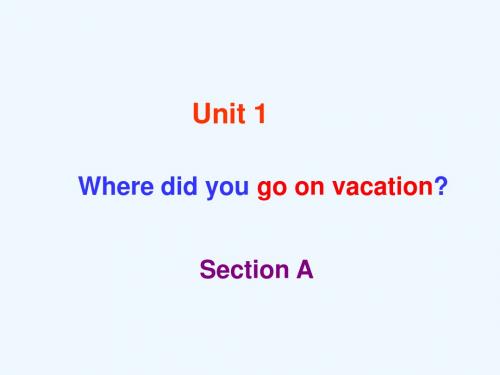
1b
Tapescript
Conversation 2 Girl: Where did you go on vacation, Sally? Sally: Nowhere. I stayed at home. Girl: And where did you go, Brad? Brad: I visited my uncle. Conversation 3 Boy 1: Where did you go on vacation, Tom? Tom: I went to summer camp. It was great.
1b
Listen. Number the people (1-5) in the picture.
4 1
2
5
3
1b
Tapescript
Conversation 1 Xiang Hua: Hey, Tina. Where did you go on vacation? Tina: I went to the mountains. Xiang Hua: Cool. Tina: Where did you go, Xiang Hua? Xiang Hua: I went to New York City.
2d
Role- play the conversation
语法点和词组 3. We took quite a few photos there. take photos = take pictures 照相 take a photo of sb. 给某人拍照 考例:People are not allowed to _____ (拍 照) in a museum. 4. Did you do anything special last month? 形容词和不定代词搭配,形容词在不定代词 的后面。
2013年秋新版人教新目标版八年级英语上册Unit1单元综合试卷及答案
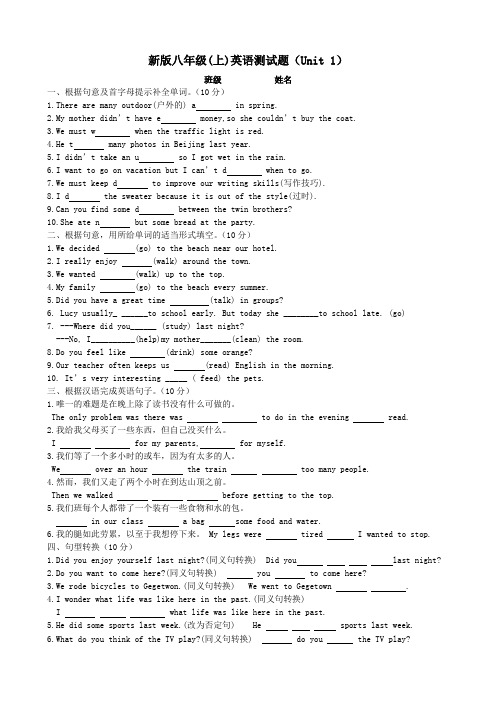
新版八年级(上)英语测试题(Unit 1)班级姓名一、根据句意及首字母提示补全单词。
(10分)1.There are many outdoor(户外的) a in spring.2.My mother didn’t have e money,so she couldn’t buy the coat.3.We must w when the traffic light is red.4.He t many photos in Beijing last year.5.I didn’t take an u so I got wet in the rain.6.I want to go on vacation but I can’t d when to go.7.We must keep d to improve our writing skills(写作技巧).8.I d the sweater because it is out of the style(过时).9.Can you find some d between the twin brothers?10.She ate n but some bread at the party.二、根据句意,用所给单词的适当形式填空。
(10分)1.We decided (go) to the beach near our hotel.2.I really enjoy (walk) around the town.3.We wanted (walk) up to the top.4.My family (go) to the beach every summer.5.Did you have a great time (talk) in groups?6. Lucy usually_ ______to school early. But today she ________to school late. (go)7. ---Where did you______ (study) last night?---No, I__________(help)my mother_______(clean) the room.8.Do you feel like (drink) some orange?9.Our teacher often keeps us (read) English in the morning.10. It’s very interesting _____ ( feed) the pets.三、根据汉语完成英语句子。
- 1、下载文档前请自行甄别文档内容的完整性,平台不提供额外的编辑、内容补充、找答案等附加服务。
- 2、"仅部分预览"的文档,不可在线预览部分如存在完整性等问题,可反馈申请退款(可完整预览的文档不适用该条件!)。
- 3、如文档侵犯您的权益,请联系客服反馈,我们会尽快为您处理(人工客服工作时间:9:00-18:30)。
Where did she go on vacation ?
She stayed at home and watched TV .
Where did they go on vacation ?
They went to the mountains .
summer camp
Where did they go on vacation ?
瞬间记忆 (如果你能 用过去式 说出短语, 拜访我 参观博 就能得到 叔叔2 物馆3 相应分数, 去夏令 去海滩3 快快加油 营3 去爬山 呦!)
3 呆在家 里2 做作业2 去纽约 2
PAIRWORK :
A: Where did you/ he/she/they go on vacation ? B: I/He / She /They …
3. There be 结构:There+ be(was/were)+其他 (肯定句) 1) There was a car in the park yesterday. 2) There were some cars in the park yesterday. (否定句)3) There wasn’t a car in the park yesterday. 4) There weren’t any cars in the park yesterday. (疑问句)5) ——Was there a car in the park yesterday? —— Yes, there was. /No, there wasn’t. 6) —— Were there any cars in the park yesterday? —— Yes, there were. /No, there weren’t。
1. What did you say? 你说什么? 2. I thought you were out. 我以为你出去了。 3.Pardon? I didn‘t catch it. 你说什么?我没有听见。
一般过去式助记口诀
事情已发生,要用一般过去时。 主语在句首,后面跟着动词过去式。 动词过去式,变化有规律, 还有特殊变化要牢记。 一般过去时并不难,表示过去动作、状态记心间。动词 要用过去式,时间状语句末站。 否定句很简单,didn't 站在动词原形前,其它部分不 要变。 一般疑问句也好变,did放在句子前,主语、动词原形、 其它部分依次站。 特殊疑问句也简单,疑问词加一般疑问句记心间。 后一条请注意,动词过去式要牢记。
Conversation 2
on vacation Girl: Where did you go __________, Kevin? went to the beach Kevin: I _____________. G: oh, that’s nice. Did you play volleyball? K: No, I didn’t. G: Well, did you swim? K: Yes, I did. The water was really warm. G: How was the food? tasted really good K: Everything_______________! G: Did you meet anyone interesting? met some very interesting people K: Yes. I _____________________________.
Julie
√
√
Conversation 1
Boy: Where did you go on vacation, Grace? went to New York City Grace: I ______________. B: Oh, really? Did you go with anyone? G: Yes. I ________________. went with my mother B: Did you go to Central park? bought something for my father G: Yes. I_____________________. B: Oh, really? Really? G: I bought him a hat.
D 3. There’s________in the newspaper. You should read it. A. important something B. something boring C. boring something D. something important
根据汉语完成句子,每空一次。 1.–你的姐姐假期到哪儿去了? ---她去参加夏令营了。 Where did go on ---______ ______ your sister______ _____ vacation? went to ---She______ ______ summer camp. 2. ---杰夫,你去了一些有趣的地方吗? ---是的, 我和我的朋友们去了参观博物馆。 Did ---Jeff, _____ you go______ __________? anywhere interesting ---Yes, I _________ _______ ________ friends. Visited museums with 3. ----昨天你买到什么特别的东西了吗? —没,我什么也没买到。 anything ______ Did —______ you buy_______ special yesterday? ---No, I ______ _______. bought nothing
一般过去式的基本结构
1.谓语为一般动词时:主语 + 动词过去式 + 其它。 (变疑问句和否定句时借助助动词did)
(肯定句) 1) Tom came to China last year. 2) I watched TV yesterday. ( 否定句) 4) She didn't visit his uncle last week. (疑问句)3) ——Did you get to school late yesterday? ——Yes, I did. /No, I didn’t.
Unit 1 Where did you go on vacation?
Section A 1a—1c
What did they do?
They were on vacation.
=on holidays 在度假中
beach Where did you go on vacation ? I went to the beach .
复合不定代词的用法
1.不定代词some, any, no, every与-one, -body, -thing构 成复合代词。我们称之为复合不定代词。 somebody 某人 anybody 任何人 someone 某人 anyone 任何人 something 某物,某事 Anything 任何事物
nobody 没有人 no one 没有人 nothing 没有东西
Everybody 每人 Everyone 每人 Everything 一切
含-body的复合不定代词与含-one的复合不定代词在功能和意义上完全相同,可以 互换。只是用-body时显得较通俗些,多用于口语中,用-one时显得较文雅些,更 常见于正式场合及书面语中。
New York City
Where did he go on vacation ? He went to New York City .
museum
Where did he go on vacation? He went to the museum.
He visited museums.
Where did she go on vacation? She visited her friend.
1.形容词修饰不定代词,形容词要放在这些不定代词的后面, 如 anything interesting , something special。 2. 不定代词做主语,其后谓语动词用单数。如: Someone was angry.
1. No one ________ how to do it. B A.know B. knows C. knowing D. knowes 2. Everything_____OK, isn’t it? D A. was B. are C. and D. is
2.谓语为be 动词 时:主语+be(was/were)+其他 (肯定句)1)I/He/She was a student 3 years ago.
2)We/You/They were all at home yesterday. (否定句) 3) I/He/She wasn’t a student 3 years ago. 4) We/You/They weren’t students. (疑问句) 5)—— Was He/She a student? —— Yes, He/She was. /No, He/She wasn’t. 6) —— Were they students? —— Yes, they were. /No, they weren’t.
常见的时间状语
1. yesterday, the day before yesterday, in the past,etc. 2. last night/week/month/year…; 1 hour/3days/… ago; etc.
注意:有些情况,发生的时间不很清楚,但实际上是 过去发生的,应当用过去时。
Yes, she did.
Did you…
go with anyone?
